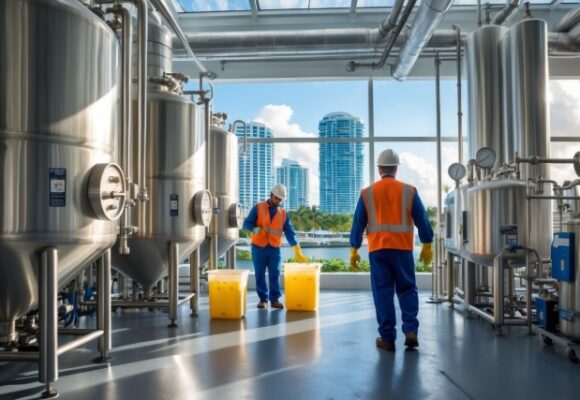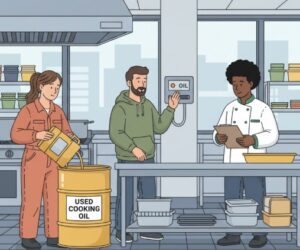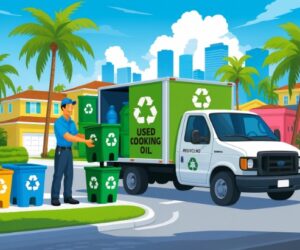
Grease Recycling in Miami: Grease From Fryer to Biodiesel- Experts’ Insight

Used cooking oil from Miami kitchens can be collected, filtered, and converted via transesterification into ASTM-grade biodiesel (often used as B20), cutting lifecycle emissions while keeping FOG out of sewers.
Restaurant grease recycling in Miami turns waste cooking oil into biodiesel fuel. This helps businesses stay compliant and gives a boost to clean energy production.
Specialized companies come by to collect used fryer oil from Miami restaurants. They convert it into renewable fuel, so owners get proper waste disposal, stay on the right side of the rules, and sometimes even get paid for their old oil.
Miami’s organized oil recycling effort links up local food businesses with biodiesel producers. If you understand how this works, you’ll make better choices about grease disposal and help out the environment at the same time.
Key Takeaways
- Miami restaurants can earn money while properly disposing of used cooking oil through professional recycling services.
- Grease disposal regulations require compliance with permits and inspections to avoid costly violations.
- Used cooking oil recycling produces biodiesel fuel that can run in standard engines without modification.
Miami’s Grease Problem—And the Clean Energy Opportunity

Miami restaurants face a significant waste problem. A single full-service kitchen averages 35 pounds of spent oil per day. That’s a lot of used cooking oil piling up fast.
The city’s humid climate just makes things messier. Warm pipes let grease build up in sewers even quickly. And when hurricane season rolls in, the risk of spills and fines goes way up.
The Scale of Waste:
- 35 pounds of oil daily per restaurant
- Thousands of restaurants across Miami-Dade
- Risk of clogged sewers and expensive cleanup
When restaurants pour grease down the drain, it causes Fats, Oils, and Grease (FOG) issues. FOG buildup threatens Miami’s water systems and Biscayne Bay.
However, here’s the twist—this waste can be converted into clean energy. Used cooking oil doesn’t have to end up in landfills. It can be turned into biodiesel fuel.
Clean Energy Benefits:
- Reduces carbon emissions
- Creates renewable fuel
- Keeps waste out of waterways
- Saves businesses money on disposal
Miami-Dade franchise operations collected 23,000 gallons of cooking oil last year. Converting that into biodiesel prevented approximately 230 tons of carbon from entering the air.
When restaurants partner with recycling services, kitchen waste is converted into clean fuel. That’s a win for Miami’s environment.
Keep your kitchen compliant and eco-friendly with Grease Pros Recycling’s grease trap cleaning service. Save money, avoid fines, and recycle responsibly—contact us today to schedule.
If you’re ready to get started, call us now!
How Grease Recycling Works (From Fryer To Biodiesel)

So, how does old fryer oil end up in a fuel tank? The process is pretty straightforward but surprisingly important.
Companies collect used cooking oil directly from restaurants and food businesses in Miami.
Collection and Transport
Recycling trucks make regular stops on their routes. They pump cooled grease from fryer bins into special tanks. Some companies even filter and recycle the oil for reuse.
Processing Steps
The real magic happens with a process called transesterification. Here’s the rundown:
- Step 1: Filter out food particles from the oil
- Step 2: Heat the oil to the right temperature
- Step 3: Mix with methanol and a catalyst (usually sodium hydroxide)
- Step 4: Separate the biodiesel from glycerin byproducts
Chemical Reaction
During this step, waste oil mixes with methyl alcohol and a catalyst. The catalyst kicks off a reaction that breaks down the oil molecules.
Final Product
The result? Biodiesel burns cleaner than regular diesel. Recycled cooking oil cuts greenhouse gas emissions by up to 80% compared to traditional diesel.
Quality Control
Facilities test the biodiesel to make sure it meets fuel standards before shipping it out. They usually sell the leftover glycerin for soap and other products, which keeps the process efficient.
Do Miami Restaurants Need A GDO Permit?
Yes, all food service establishments in Miami-Dade County require a current Grease Discharge Operating Permit. That means restaurants, cafeterias, bakeries, coffee shops, juice bars—you name it.
The Miami-Dade County Department of Environmental Resources Management oversees the issuance of grease trap permits. Any non-residential food facility needs a FOG operating permit.
Key Requirements:
- Valid GDO permit from DERM
- Working grease trap installed
- Regular maintenance and cleaning
- Monthly reporting compliance
The rules are derived from Section 24, 42.6 of the Miami-Dade County Code. The law took effect following a 2018 federal court order.
Reporting Deadlines: If you have an OP or GENOP permit, you’ve got to submit a Liquid Waste Transporter Electronic Manifest by the 20th of each month when your grease trap gets cleaned.
All GDO permits expire on December 31 each year and need renewal. Restaurants must keep grease trap cleaning records and submit those reports to avoid trouble.
If you don’t comply, you risk fines and headaches for your business.
Turn fryer oil into renewable energy with Grease Pros Recycling’s biodiesel conversion service. Protect your business and the environment—schedule your grease pickup with us now.
If you’re ready to get started, call us now!
Is Turning Used Cooking Oil Into Biodiesel Worth It?
Turning used cooking oil into biodiesel brings numerous benefits for restaurants and the planet. The process creates a renewable alternative to fossil fuels and cuts down waste disposal costs.
Economic Benefits:
- Lower waste disposal fees
- Possible revenue from selling oil
- Reduced fuel costs for those using biodiesel
Environmental Impact: Biodiesel made from used cooking oil emits significantly less carbon than regular diesel. Recycling turns fryer oil into low-carbon biodiesel using certified collection and processing systems.
The conversion process mixes waste oil with methanol and a catalyst. An ester combines with alcohol to make usable biodiesel fuel.
Challenges to Consider:
| Factor | Impact |
| Collection costs | May reduce profit margins |
| Processing requirements | Needs specialized equipment |
| Market demand | Varies by location |
The most eco-friendly biodiesel feedstocks are used grease and oil; therefore, restaurant waste is actually quite valuable.
The effectiveness of this approach depends on the local market and the collection infrastructure. The commercial processing of used fryer oil into biodiesel gained momentum in the early 2000s.
Most restaurants view the environmental benefits and cost savings as compelling reasons to consider biodiesel conversion. As clean energy demand rises, the economic case for recycling continues to strengthen.
Where Does Miami’s Recycled Grease Go?
What happens to all that used cooking oil in Miami? Licensed haulers collect grease from local restaurants and haul it off to processing facilities.
Once there, workers clean and filter the oil. They remove food bits and water, leaving behind clean oil that’s ready for its next use.
Primary Uses of Miami’s Recycled Grease:
- Biodiesel fuel production
- Renewable diesel manufacturing
- Industrial lubricants
- Animal feed ingredients
Last year, Miami-Dade franchises collected 23,000 gallons of cooking oil for biodiesel production. That kept about 230 tons of carbon emissions out of the air, which is no small feat.
Biodiesel plants around South Florida buy this processed oil. They mix it with alcohol and catalysts to make biodiesel fuel.
This material ultimately powers trucks, boats, and generators throughout the region. Some recycled grease is also turned into renewable diesel.
Renewable diesel is compatible with regular diesel engines. You don’t even need to modify anything, and it burns cleaner than traditional petroleum-based fuels.
Companies like Restaurant Technologies run the show right from their Miami depots. They handle everything—from picking up the grease to delivering the finished product.
Most recycled products either remain in Florida or are shipped to nearby states. This helps reduce transport costs and supports local sustainability efforts.
Miami restaurants actually benefit from this setup. They dodge disposal fees and pitch in for local green energy at the same time.
How Grease Pros Recycling Protects Your Operation
Grease Pros Recycling brings 20+ years of experience to the Miami food scene. They truly understand the intricacies of local health codes and environmental regulations.
Their certified technicians handle every part of grease collection and processing. You can count on them to get it right—from picking up all the way to turning it into biodiesel fuel.
Authority in the Field
- Licensed waste management professionals
- EPA-compliant processing facilities
- Solid relationships with Miami restaurants
- They know Miami-Dade County regulations inside and out
The company maintains transparency through clear and concise documentation. Restaurant owners get detailed pickup records and compliance certificates for their files.
Grease Pros takes safety seriously during all collection operations. Their team works hard to prevent spills and contamination—nobody wants a mess, right?
Trust Through Reliability
| Service Area | Benefit |
| Scheduled Pickups | Prevents overflow issues |
| Emergency Service | 24/7 availability for urgent needs |
| Proper Documentation | Keeps compliance records up to date |
| Insurance Coverage | Shields against liability |
They adhere to service schedules that are tailored to each restaurant. That kind of reliability helps avoid grease trap overflows and keeps health inspectors happy.
The company’s restaurant grease recycling services utilize proper disposal methods to prevent waste from entering sewers. That protects Miami’s water and saves restaurants from nasty fines.
By converting waste cooking oil into biodiesel, they’re turning what could be a problem into something useful. Not a bad deal for everyone involved.
Restaurant Checklist—Stay Compliant & Turn FOG Into Fuel (Action Steps)
Miami restaurants must follow specific guidelines to comply with FOG regulations. At the same time, they can find ways to recycle and maybe even profit from it.
This checklist helps operators avoid fines and extract value from what used to be waste.
| Category | Action Items | Notes/Compliance Tips |
| Daily Tasks | – Check grease traps for proper function.- Inspect oil storage containers for leaks.- Clean kitchen equipment after each shift.- Record all grease removal activities in a log. | Keep a daily logbook; inspectors often request written proof. |
| Weekly Requirements | – Pump grease traps at 25% capacity.- Replace exhaust hood filters.- Inspect UCO storage and collection areas.- Schedule pickups with licensed haulers.- Maintain records of FOG removal for at least two years. | Documentation is key—Miami-Dade inspectors may request logs anytime. |
| Monthly Actions | – Review recycling contracts with haulers.- Retrain staff on proper grease disposal.- Inspect and service grease-related equipment.- Update compliance paperwork.- Consider hiring a professional FOG compliance auditor. | Training refreshers reduce mistakes and prevent costly violations. |
| Key Compliance Points | – Never pour grease down the drain.- Only use permitted waste oil collectors.- Save all receipts and manifests.- Follow Miami-Dade GDO rules.- Stay proactive with maintenance. | Following local regulations helps you avoid fines and unlocks the value of converting waste into biodiesel. |
Miami restaurants trust Grease Pros Recycling’s grease pickup service to stay compliant and sustainable. Transform waste into value while meeting county regulations—contact us to schedule service.
Contact Us Today For An Appointment
Frequently Asked Questions
What is grease recycling in Miami?
Grease recycling in Miami is the process of collecting used cooking oil and fats from restaurants and converting them into biodiesel fuel. At the same time, ensure operations comply with county FOG (fats, oils, and grease) rules.
How does fryer oil turn into biodiesel?
Used cooking oil is filtered, treated, and chemically converted through a process known as transesterification into biodiesel that meets ASTM fuel standards. The result is a renewable fuel that is compatible with most diesel engines.
Do Miami restaurants need a permit for grease recycling?
Yes. Miami-Dade County requires non-residential food service businesses to hold a Grease Discharge Operating (GDO) permit, maintain grease traps, and use permitted haulers.
What are the penalties for improper grease disposal in Miami?
Improper grease disposal can lead to clogged sewers, citations, and fines from Miami-Dade County. Repeat violations may result in suspended permits and higher cleanup costs.
Can restaurants make money from recycling fryer oil?
In some cases, yes. Licensed haulers and recycling companies may offer rebates or credits for high-volume used cooking oil, especially when it’s converted into biodiesel.
Why choose biodiesel from fryer oil over traditional diesel?
Biodiesel reduces lifecycle greenhouse gas emissions, improves air quality, and supports a circular economy by turning waste oil into a clean fuel alternative.
How often should a grease trap be cleaned in Miami?
Miami-Dade requires grease traps to be serviced at least every 90 days or sooner if they reach 25% of their capacity. Proper maintenance ensures compliance and prevents costly blockages.





